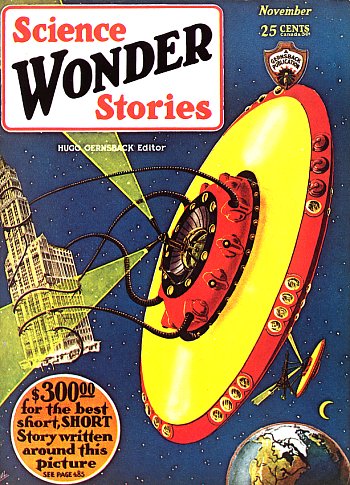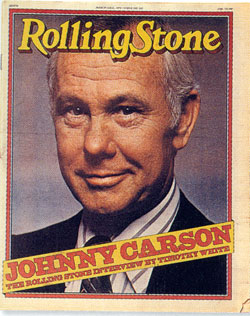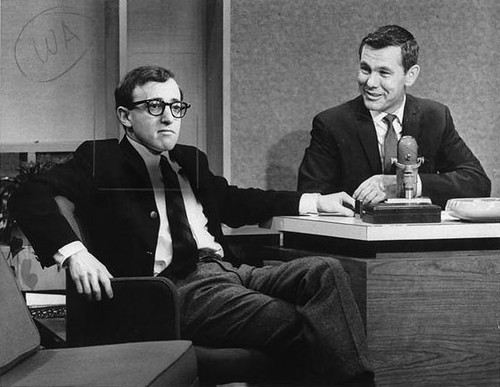Gates of Heaven

I wouldn't really be me if it weren't for Woody Allen, not just because of his own work but also because of the work of others he's led me to. When I was in high school, learning about Woody led me to discover some of my favorite things: Robert Benchley's funny essays, Buster Keaton's silent comedies, the Marx Brothers. (In Eric Lax's 1975 book
On Being Funny: Woody Allen and Comedy, Woody says that the Marx Brothers film
Duck Soup is the only funny movie he can think of that doesn't have any slow spots. In
Hannah and Her Sisters, seeing
Duck Soup leads Woody's character, who's been fretting about his mortality, to decide that life isn't so bad after all.)
In the summer of 2008, I listened to
this interview with Woody, in which he discusses his love for the early jazz recordings of Louis Armstrong, Sidney Bechet, and Jelly Roll Morton.
I'd heard the interview before, but this time I thought, "You know what? I should listen to those old recordings. If Woody likes 'em, I bet they're great." So I immediately set about finding as many of those old recordings as I could. Those three guys and their music became my new obsession.
I'm always obsessed with something or other. I've always been that way. My childhood was one long string of obsessions: Disney animation, magic, the Beatles, juggling, breakdancing, the Rubik's Cube. I'll get interested in something and it'll take over my life. Then one day something else will catch my attention and suddenly I'll have a new obsession. A couple of years ago, I was obsessed with Stanley Kubrick. Now my days are spent listening to, and reading about, Armstrong, Bechet, and Jelly Roll.
I've been obsessed with this music for over a year now, and in that time I've heard a lot of recordings. I've collected 37 of my favorites in a playlist, Playlist 2 it's called, on my MySpace page, which can be found
here.
From Playlist 2 I selected 10 songs for my profile playlist. They are listed below, with notes to enhance your enjoyment.
1. "Everybody Loves My Baby" by Clarence Williams' Blue Five
(Recorded November 6, 1924, in New York City)
On this song, the cornet (an instrument almost exactly like a trumpet) is played by Louis Armstrong, who was 23 at the time. On some Blue Five recordings, the soprano sax is played by Sidney Bechet, but on this one it's played by a fellow named Buster Bailey. The vocalist is Eva Taylor. She was married to Clarence Williams, who played piano on the Blue Five records and organized the recording sessions.
2. "Lazy River" by Louis Armstrong and His Orchestra
(Recorded November 3, 1931, in Chicago)
This is one of just a handful of recordings Armstrong made in the early '30s. During that time, he was on the run from gangsters, so he largely avoided Chicago and New York. In Chicago some months prior to this session, a gangster pulled a gun on Armstrong and made him agree to be on a train to New York the next morning for a gig. Armstrong wasn't on that train, and ended up spending much of the next few years in Europe. He returned to America in 1935, at which point he hired as his manager his old friend Joe Glaser, a tough cookie who, it was said, had worked for Al Capone. Glaser resolved Armstrong's problems with the gangsters, and remained Armstrong's manager until he, Glaser, died, in 1969. Armstrong died two years later.
3. "Cake Walking Babies From Home" by the Red Onion Jazz Babies
(Recorded December 22, 1924, in New York City)
The Red Onion Jazz Babies and Clarence Williams' Blue Five were basically the same band. Both were organized by Clarence Williams and they featured most of the same musicians. Alberta Hunter, rather than Eva Taylor, sang on the Jazz Babies records. (On this tune, she's joined on vocals by Clarence Todd.) And, instead of Clarence Williams, the pianist for the Jazz Babies was Lil Hardin, who'd recently become Armstrong's second wife. (His first wife was an insanely jealous New Orleans prostitute named Daisy Parker. Daisy always carried a razor and wasn't shy about pulling it out.) Seventeen days after this Jazz Babies session, the Blue Five did their version of "Cake Walking Babies," which you'll find in Playlist 2. On both versions, Armstrong plays cornet and Sidney Bechet plays soprano sax.

4. "Blues My Naughty Sweetie Gives to Me" by Sidney Bechet
(Recorded November 5, 1951, in New York City)
Woody Allen and his wife, Soon-Yi, have two adopted children. Both are girls; one's Asian, one's white. The Asian one is named Bechet, after you-know-who; the white one is named Manzie, after Manzie Johnson, the guy playing the drums on this recording.
5. "Potato Head Blues" by Louis Armstrong and His Hot Seven
(Recorded May 10, 1927, in Chicago)
Toward the end of
Manhattan, Woody's character lists 11 things that, in his opinion, make life worth living. This recording is one of them.
6. "Polka Dot Stomp" by Noble Sissle and His International Orchestra
(Recorded August 15, 1934, in Chicago)
Sidney Bechet plays clarinet and soprano sax on this jaunty number, which he wrote with bandmate James Tolliver, who plays clarinet and tenor sax on this. Woody Allen once called a Bechet concert he attended in the '50s "the most fulfilling artistic experience of my life." "Bechet was a startling musician," he said. "His ferociousness was incredible. I was struck by the intensity and total majesty of his playing." After watching one of his friends buy his first Bechet album, Woody told him, "I'd give anything to be you and hear that for the first time."
7. "Squeeze Me" by Louis Armstrong and His Hot Five
(Recorded June 29, 1928, in Chicago)
Armstrong did some scat singing on "Lazy River," but on this recording his entire vocal is scat. Another good example of Armstrong's scatting can be heard on "Hotter Than That," which is in Playlist 2. Before Armstrong popularized it, scat singing was virtually unknown outside New Orleans.
8. "Muskrat Ramble" by Louis Armstrong's Hot Five
(Recorded February 26, 1926, in Chicago)
The Hot Five that recorded "Squeeze Me" was a different Hot Five from the Hot Five that recorded this tune. The only musician who was in both bands was Armstrong himself. When trombonist Kid Ory left this earlier version of the Hot Five, Armstrong replaced him with John Thomas and added a tuba player and a drummer and the band became the Hot Seven. The Hot Five and Hot Seven records were Armstrong's first recordings where he was in charge. They're widely considered to be the most important records in jazz history. The Hot Seven recording "Melancholy Blues" was included on the Voyager Golden Record, which was launched into space in 1977. The Golden Record's contents were selected by a committee led by Carl Sagan, who wrote, "The spacecraft will be encountered and the record played only if there are advanced spacefaring civilizations in interstellar space. But the launching of this 'bottle' into the cosmic 'ocean' says something very hopeful about life on this planet."

9. "Wolverine Blues" by Jelly Roll Morton's Red Hot Peppers
(Recorded June 10, 1927, in Chicago)
This recording features a scaled-down version of the Red Hot Peppers. It's just three musicians: Jelly Roll on piano, Johnny Dodds on clarinet, and Johnny Dodds's little brother, Baby Dodds, on drums. Johnny Dodds was a member of the original incarnation of Armstrong's Hot Five, and both Dodds brothers were members of the Hot Seven. They'd known Armstrong in New Orleans, where they'd spent a few years playing alongside him on a riverboat called the S.S.
Sydney.
10. "Too Busy" by Lillie Delk Christian with Louis Armstrong and His Hot Four
(Recorded June 26, 1928, in Chicago)
Lillie Delk Christian, who sounds a bit like Snow White, was nothing special as a singer, but at the time of this session Louis Armstrong was at the height of his powers. Near the end of this song, we get a little sample of the kind of scat singing he'd do on "Squeeze Me" just three days later.












:max_bytes(150000):strip_icc()/robert_benchley-getty-56af952b5f9b58b7d01ad235.jpg)










